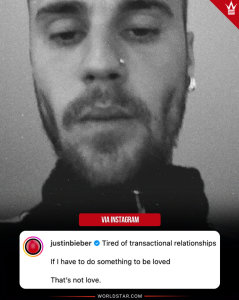The Paradox of Conditional Love: A Reflection on Justin Bieber’s Instagram Post
Justin Bieber’s recent Instagram post, which reads, “Tired of transactional relationships. If I have to do something to be loved, that’s not love,” encapsulates a profound and universal struggle with the nature of love, authenticity, and human connection. At its core, this statement challenges the commodification of relationships—whether romantic, familial, or platonic—where affection is treated as a reward for meeting certain conditions. In a world increasingly driven by performance, social media validation, and material exchange, Bieber’s words resonate as a call for unconditional love and emotional honesty.
Transactional Relationships: A Modern Epidemic
A transactional relationship is one where love, attention, or care is contingent upon what one can provide—whether it’s money, status, favors, or emotional labor. These relationships are exhausting because they reduce human connection to a barter system: “I’ll give you this if you give me that.” This dynamic is pervasive in modern society:
-
Romantic relationships where partners keep score of who did what, or where affection is withheld as punishment.
-
Familial bonds where love is conditional on achievements, obedience, or conformity to expectations.
-
Friendships that exist only when convenient or beneficial, dissolving when one party can no longer “offer” something.
Bieber’s post hints at the emotional toll of such interactions. For someone in the public eye, where relationships are often scrutinized and motives questioned, the exhaustion is amplified. The pressure to perform, to please, and to maintain an image can make genuine connection feel impossible.
Unconditional Love: Myth or Reality?
The idea of unconditional love—love without strings or prerequisites—is both aspirational and contentious. Philosophically, it aligns with spiritual and ethical ideals (e.g., “agape” love in Christianity or Buddhist compassion). Yet, in practice, humans are flawed; our love is often tangled with expectations, insecurities, and self-interest.
Bieber’s statement suggests a yearning for purity in love, but it also raises questions:
-
Is unconditional love realistic, or does it enable toxicity? (e.g., staying in abusive relationships under the guise of “unconditional” loyalty.)
-
How do we balance boundaries with selflessness?
Perhaps the healthiest form of love is intentional rather than transactional—a choice to love without coercion, but with mutual respect and accountability.
Social Media and the Performance of Love
The irony of Bieber’s post appearing on Instagram—a platform built on curated personas—is hard to ignore. Social media thrives on transactional engagement: likes for validation, follows for clout, comments for visibility. When relationships migrate online, they risk becoming performative, reducing love to a public display rather than a private, sustained commitment.
For celebrities, this performance is magnified. Every post, every interaction is analyzed, and fans often equate visibility with authenticity. Bieber’s message, then, feels like a rebellion against the very platform he’s using—a moment of raw honesty in a space designed for polish.
The Path to Authentic Connection
Breaking free from transactional patterns requires:
-
Self-awareness: Recognizing when we’re treating love as a currency—or allowing others to do so.
-
Vulnerability: Letting go of the fear that love will disappear if we stop “performing.”
-
Boundaries: Understanding that unconditional love doesn’t mean tolerating harm.
Bieber’s post, though brief, invites a deeper conversation about what love should be. In a culture that often conflates worth with utility, his words are a reminder that love is not a transaction—it’s a gift, given and received freely.

